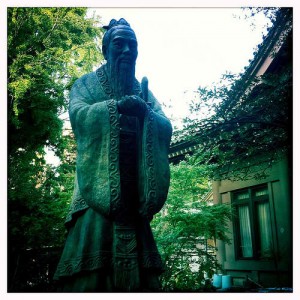Confucianism is a philosophical and ethical system or a way of life taught by Confucius in the 5th-6th century BC. Some see it as philosophy or religion, as an “all-encompassing humanism that neither denies nor slights heaven”.
Confucianism is known to be a combination of ren also known as “benevolence or humaneness” of people within a community. It is a reflection of excellent character in accordance to li or ritual norms, yi or the moral disposition to do good, zhong which is loyalty to one’s nature, shu or reciprocity and xiao filial piety. Altogether they are seen as de or virtue. Confucius also believes that it is necessary to give up one’s life “passively or actively for the sake of upholding cardinal and moral values.
These beliefs are all characteristics of a positive view of human nature and faith that all human beings are gifted and can do wonderful things. They are all capable of improving, being taught and reaching a certain level of perfection through ‘self-cultivation and self-creation’.
Confucius saw heaven or T’ienas a personal universal force and he regarded it as positive. This belief was contrary to what people assumed that he was a skeptic or agnostic who did not believe in a higher power.
Confucianism does not have specific rituals or practices apart from its ‘ethical principles’. Most of these so called practices are a combination of Taosim, Buddhism and Chinese religion.
This way of thinking has a huge following. It has become a moral compass, even influencing political and spiritual life in China. It has even spread out to neighboring Asian countries such as Taiwan, Korea, Vietnam and Japan.
Image from eerkmans
Originally posted on January 31, 2012 @ 1:48 am

 Ever wondered about the area about politics that makes it so ideal and pristine, Ethics. As it turns out, the very first philosopher to ever suggest the relationship between politics and ethics was the famous Chinese philosopher Confucius who emphasized personal and governmental morality. As we all know, most governments are founded on a set of rules or laws that have been refined and revised throughout that specific country’s history. The great civilizations of the ancient times such as the Egyptians and the Maya’s have their forms of governance patterned after nature and that in nature there is a supreme being that makes all things happen. This supreme being (which is embodied by a king or other form of ruler) can and has the right to revise and formulate laws as they see fit based on either personal preferences and historical facts (which is the written or oral history of the race or tribe which states or defines the role of the leader) however long the said culture might have existed. These cultures may have come and gone but their influence and views on how the world, life and self-governance happens is history. The English, French and other major civilizations of Medieval times went through several upheavals in government because of corruption and other related matters. The Greeks began the study of philosophy as part of their quest in understanding the why, what, where and who’s of life. Why did the sun set at night, why do the flowers bloom during spring and many other questions people might ponder about were thought of an explanation collectively by scholars and philosophers of the day.
Ever wondered about the area about politics that makes it so ideal and pristine, Ethics. As it turns out, the very first philosopher to ever suggest the relationship between politics and ethics was the famous Chinese philosopher Confucius who emphasized personal and governmental morality. As we all know, most governments are founded on a set of rules or laws that have been refined and revised throughout that specific country’s history. The great civilizations of the ancient times such as the Egyptians and the Maya’s have their forms of governance patterned after nature and that in nature there is a supreme being that makes all things happen. This supreme being (which is embodied by a king or other form of ruler) can and has the right to revise and formulate laws as they see fit based on either personal preferences and historical facts (which is the written or oral history of the race or tribe which states or defines the role of the leader) however long the said culture might have existed. These cultures may have come and gone but their influence and views on how the world, life and self-governance happens is history. The English, French and other major civilizations of Medieval times went through several upheavals in government because of corruption and other related matters. The Greeks began the study of philosophy as part of their quest in understanding the why, what, where and who’s of life. Why did the sun set at night, why do the flowers bloom during spring and many other questions people might ponder about were thought of an explanation collectively by scholars and philosophers of the day.